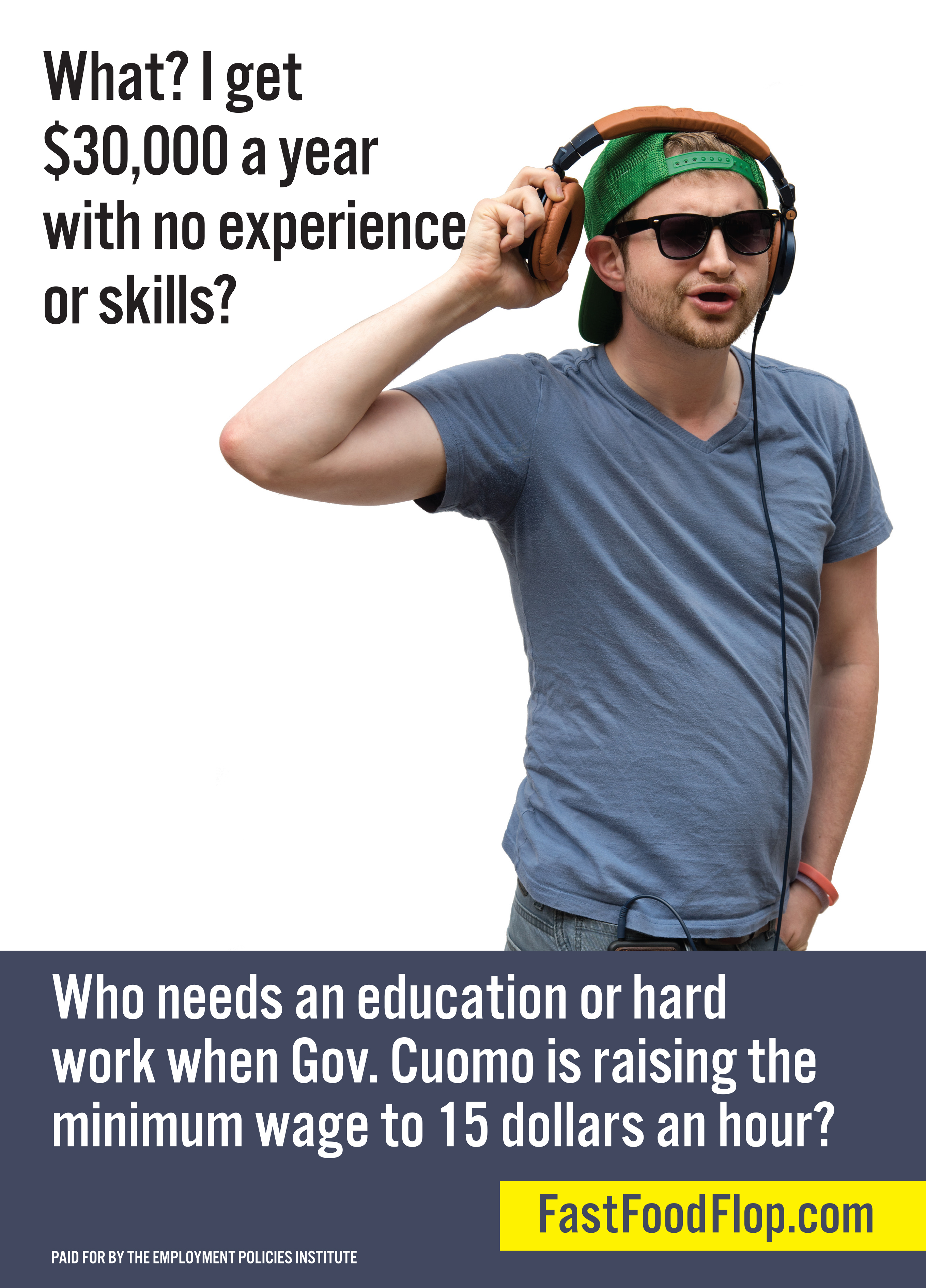The 3 Most Outrageous Minimum Wage Memes
By:
Peering through sunglasses over the endless swarm of people in the commercial panopticon that is New York City's Times Square, is a scruffy, t-shirted young man in a backwards cap who, according to the billboard, is the most notable beneficiary of the state's new push for a $15 minimum wage for fast food workers.
"What?," the man asks, peeling off one headphone. "I get $30,000 a year with no experience or skills?"
 Minimumwage.com - minimumwage.com
Minimumwage.com - minimumwage.com
The $100,000 billboard, reportedly paid for by the restaurant-industry friendly Employment Policies Institute, poses another question: "Who needs an education or hard work when Gov. Cuomo is raising the minimum wage to 15 dollars an hour?" The campaign is the latest offensive against the New York governor's proposed wage hikes, which have won overwhelming support from NYC voters, and still need the approval of the state's labor commissioner. If approved, a $15 minimum would go into effect in New York City by 2018, and statewide by 2020.
The billboard suggests that the chief beneficiaries of higher wages for fast food workers are lazy, privileged millennials who would see no reason to work hard and climb the corporate ladder. Pointing to National Employment Law Project data, however, the New York Times reports that the reality might be slightly different: while the average age of fast food workers is 29, 31 percent have at least attempted college, and more than 26 percent are raising children. As Gothamist noted, a $30,000-a-year salary is only slightly more than the average basic living expenses in the New York metro area.
As labor movements calling for $15 minimum wage have gained traction nationwide in recent years, similar tropes propagated by the Times Square ad have become commonplace. But like the ad, they present a skewed picture.
Related: 5 Reasons McDonald's Is Seriously Screwed
1.
One common thread that runs through much of the criticism of higher wages for fast food workers hones in on the perceived discrepancy between work ethic, job difficulty, and corresponding earnings. But fast food work often requires both fast-paced multitasking and administrative skills to complete required tasks, as well as a host of other challenges less implicitly associated with flipping burgers. As the Washington Post notes, fast food workers face challenges including assault, racial discrimination, sexual harassment, workplace safety, retaliatory management practices, and flagrant wage and hour violations.
Related: 6 Lies We Should Stop Spreading About Raising the Minimum Wage
Those factors do not account for the fact that up to 50 percent of fast food workers tend to have more than one job, as The Times reports, and that more than half of the families of front-line fast food workers are enrolled in one or more public assistance programs at a substantial cost to taxpayers—an estimated $7 billion each year, according to a recent University of California Berkeley study.
2.
 The Illinois Mirror - illinoismirror.com
The Illinois Mirror - illinoismirror.com
Another concern is that with employers forced to pay each employee a higher wage, many jobs will be eliminated with budgets stretched thin. This could be true to a small degree, but overwhelmingly, research shows that boosting, say, the federal minimum wage from where it currently stands, at $7.25, to $10.10 by next year would have "no discernable effect on employment," according to a review of 64 studies on minimum wage increases by the Department of Labor. As ATTN: has reported, one UC Berkeley report commissioned by the city of Los Angeles found that if the city raised the minimum wage to $13.25 an hour, job loss would be negligible while the economic stimulus would be significant. In fact, a number of different studies have found that raising the wage would actually create thousands of jobs.
3.
 Tea Party Tribune - teapartytribune.com
Tea Party Tribune - teapartytribune.com
The possibility of higher wages leading to higher prices at fast food restaurants is regularly cited as a concern for hungry consumers who might partially rely on fast food's low cost to feed themselves and their families. But as The Post points out, looking to other countries that already pay their fast food workers more, could be instructive. For example, the same menu item—a Big Mac—costs 30 cents less in New Zealand, where the server is likely unionized and makes around $12 per hour, than it does in the U.S.
That does not rule out the likely possibility that consumers would see some price increases, but research indicates that even with a $15 minimum wage for limited-service restaurants, that increase would be comparatively small—about 4.3 percent, according to a recent study conducted by Purdue University. And if New York City residents—a majority of whom say they would be willing to pay more for fast food if wages were increased—are any indication, people could be willing to fork over a little more to know that their servers were at least making a living wage.
Related: 5 Reasons McDonald's Is Seriously Screwed
Related: The 3 Biggest Myths About Raising the Minimum Wage
Related: The 2 Disturbing Ways Restaurants Are Quietly Ripping You Off
